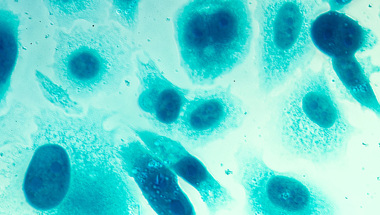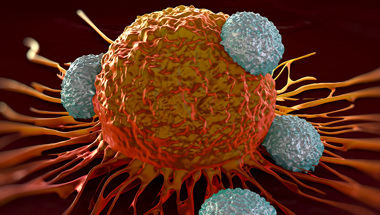Research
05 Aug 2024Could nanoparticles finally unlock the potential of immunotherapy for prostate cancer?
Delivering immunotherapy directly to tumours could help hormone therapy last longer, extending the lives of thousands of men with prostate cancer.

Immunotherapy has revolutionised the way we treat many cancers. It encourages the body's own defence mechanisms - the immune system - to target the cancer, either alone or in combination with other treatments.
However, prostate cancer is different. Unlike other cancers, it rarely responds to immunotherapy, leaving fewer treatment options for men with the disease.
That could soon change thanks to research we've funded at the University of Sheffield, which has shown that it's possible to deliver immunotherapy directly to prostate cancer cells using microscopic containers (nanoparticles).
The researchers found that the nanoparticle treatment could help men live longer, extending the amount of time it took before their prostate cancer became resistant to hormone therapy.
The study, published in the Journal for Immunotherapy of Cancer, was funded as part of our Research Innovation Awards programme, which has seen £20m invested in exciting new research over the last 10 years.
Immunotherapy extended the benefit of hormone therapy
For thousands of men with prostate cancer, hormone therapy is a powerful, first-line treatment. However, for some men, their cancer can become resistant to it, enabling the disease to grow, spread and become harder to treat.
If immunotherapy could extend the effectiveness of hormone therapy, it could offer these men a longer, healthier life.
Looking at tumour samples from both mice and men, the Sheffield team studied how immune cells inside prostate tumours behave during hormone therapy, using a technique that attaches fluorescent markers to cells so they can be seen under a microscope.
They found that a type of white blood cell, called a macrophage, collects in large numbers around tumour blood vessels during the treatment – making them well-placed targets for immunotherapy.
The researchers then developed nanoparticles that could deliver a drug to these immune cells specifically. These nanoparticles act a bit like targeted missiles – microscopic spheres with a detector on the outside that looks for macrophages, and a space inside to fit the immunotherapy drug, keeping it locked away until it reaches the right location.
The drug itself makes the macrophages produce a signal that encourages other immune cells, called T cells, to kill the nearby cancer cells.
When the treatment was combined with hormone therapy, the tumours took longer to become resistant.
The team now hopes to take the treatment from the lab into clinical trials, to see whether it helps extend the lives of men receiving hormone therapy. Since the same immune cells were found to surround blood vessels in both mice and men, the team believes the treatment has a good chance of helping men with prostate cancer.
We’re thrilled to have funded this research which shows a new form of immunotherapy could give men much more time before their cancer becomes resistant to hormone therapy.
New treatment could give men much more time
Professor Claire Lewis, from the University of Sheffield’s School of Medicine and Population Health, led the study. She said: “The onset of resistance to hormone therapy is a major clinical problem when it comes to treating men with prostate cancer as their tumours then start to regrow and spread. Once this happens, their disease is difficult to treat.
“Until now, immunotherapies for prostate cancer have been disappointing, with few men responding well to treatment. Carefully analysing the response of immune cells in prostate tumours to hormone treatment helped us to develop a way to stimulate them to fight the cancer - and prevent resistance to hormone therapy.
“We’re excited to have developed this new form of immunotherapy and that it impacts so positively on the response of prostate tumours to hormone treatment. We are now working with our clinical colleagues to explore ways to take this forward into clinical trials as soon as possible.”
Dr Hayley Luxton, our Senior Research Impact & Intelligence Manager, said: “Immunotherapy has completely changed the way other cancers are treated, but we haven’t yet seen anything even close to that success for men with prostate cancer.
“We’re thrilled to have funded this research which shows a new form of immunotherapy could give men much more time before their cancer becomes resistant to hormone therapy. It will be really exciting to see how it performs in future clinical trials, and we hope it will play a pivotal role in finally unlocking the potential of immunotherapy for men with prostate cancer.”





